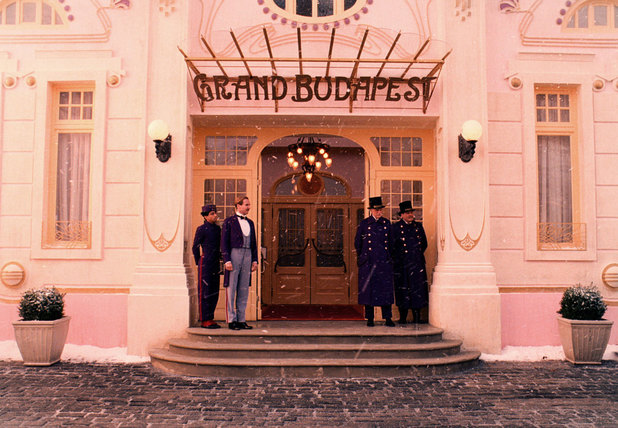 |
| Wilkommen, bienvenue, and welcome! |
In
response to the innumerable hardships of the Great Depression, Hollywood
released a series of irreverent comedies throughout the 1930’s that gave
viewers a chance to escape from their problems and kept them coming back for
their next comedic fix. These comedies, known as screwball comedies, featured
whimsical and often bizarre plots in which characters attempt to hilariously
maneuver through outrageous obstacles. As political and financial tensions
continue to mount, our own generation could use a healthy dose of screwball
escapism. Fortunately, there is a new release which not only provides the zany
fun of the 1930’s tradition, but also adds a sharp modern edge; The Grand Budapest Hotel.
The
story begins in 1968 as an unnamed British writer (Jude Law) visits the long
since dilapidated Grand Budapest Hotel in the fictional country of Zubrowka in
hopes of finding some inspiration. Over the course of his stay, the writer
befriends the hotel’s mysterious proprietor, Zero Moustafa (F. Murray Abraham),
who tells the writer the tale of how he rose from a life of poverty to become
the business tycoon that he is today. The film then flashes back to the 1930’s
as young Zero (Tony Revolori) begins on the job training in his new position as
the hotel’s lobby boy under the tutelage of the hotel’s legendary concierge,
Gustave H. (Ralph Fiennes). Zero soon learns that the debonair Gustave goes
above and beyond his duties as concierge, and provides additional services as a
‘companion’ (or as I prefer, gigolo) to many of the wealthy matrons who
frequent the hotel. All is well for the unlikely duo until one of Gustave’s
lady-friends (Tilda Swinton) is found poisoned and her scheming relatives
(headed by Adrien Brody) conveniently place the blame on Gustave, who has
inherited a priceless work of art beseeched to him in her will. A madcap caper
ensues as Zero attempts to break Gustave out of prison and catch the killer,
all while attempting to keep hold of both the priceless painting and his
relationship with local baker’s assistant, Agatha (Saoirse Ronan).
Through
its combination of a fictionalized 1930’s setting and screwball antics, the
film harkens back to the comedies of Hollywood’s Golden Age from start to
finish. Fiennes’ Gustave fills a role that in an earlier era would have been
reserved for plucky actresses such as Carole Lombard or Katherine Hepburn. As
the film progresses, Gustave is revealed to be a modernist take on Don Quixote
who sees nothing but beauty and pleasure in an increasingly difficult and ugly
world. Much like Hollywood’s former leading men and ladies before him, Fiennes imbues
his hapless hero with an endearing if delusional idealism that both lends
credibility to the plot’s often outrageous proceedings and makes it impossible for
viewers not to root for him. Tony Revolori’s Zero provides an excellent straight
man, grounding a story that otherwise revolves around Fiennes’ chaotic center.
Revolori’s deadpan delivery and apt comedic timing, played against Fiennes’
zany enthusiasm makes the pair a formidable comedy team.
 |
| Our charming hosts |
The
film’s whimsy is heightened by its equally dizzying plot and set design. After
the initial straightforward opening, the story begins spiraling into a complex
web of intrigue and thrills. Each step that Gustave and Zero take towards finding the truth serves to put them into another, even more odd, conundrum than the one
that preceded it. This approach allows the film to make the most of its
standard mystery premise and utilize it to the highest comedic potential. Similarly,
the film’s set, ranging from the pastel rococo design of the hotel to the
quaint storybook-esque city surrounding it, gives the film an unreal quality
befitting a fantasy or fairytale. Each surface of the hotel is shown in bright
colors more befitting a dessert than a luxury hotel, and the landscapes outside
hold a cut and paste quality that makes the entire film resemble a cinema sized
pop-up book. As a result, the
implausible antics of the plot seem perfectly believable in this world of make
believe.
Through
its winning combination of nostalgic humor and modern sensibility, The Grand Budapest Hotel provides modern
audiences with the sort of beguiling comedy that has been sorely lacking in
cinema for several decades. With excellent performances, a razor sharp script,
and an enchanting set, the film transports audiences into another time and
place where unknown dangers and unexpected punch lines wait around every
corner. The film manages to walk the fine line between genre homage and
original venture and is guaranteed to earn appreciation from both classic film
fans and modern cinema buffs alike. So join Zero and Gustave and check into the
Grand Budapest; chances are you’ll want to extend your stay.
 |
| The lord of the grannies |

No comments:
Post a Comment